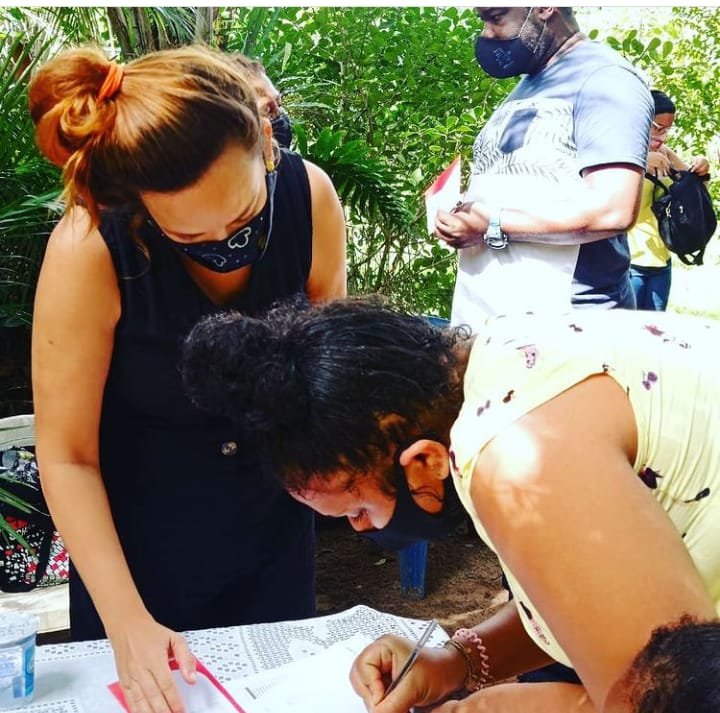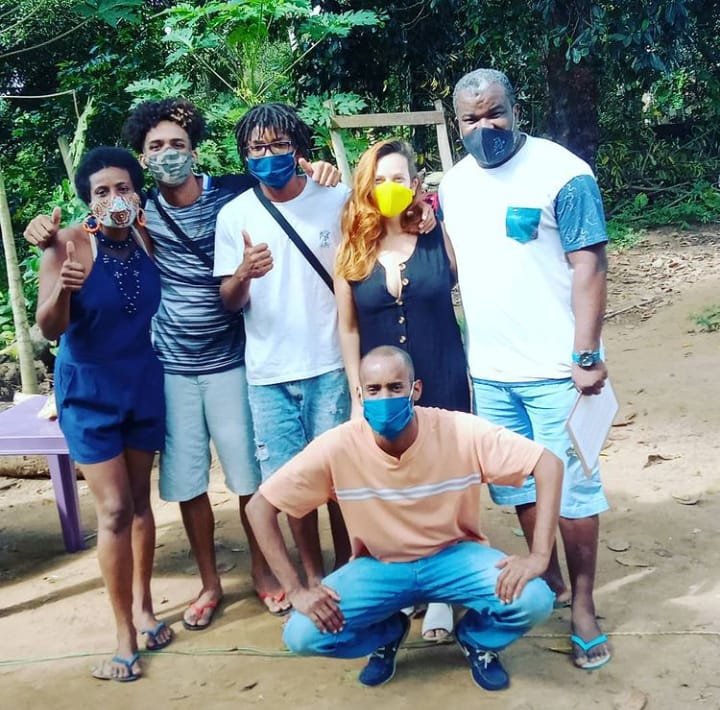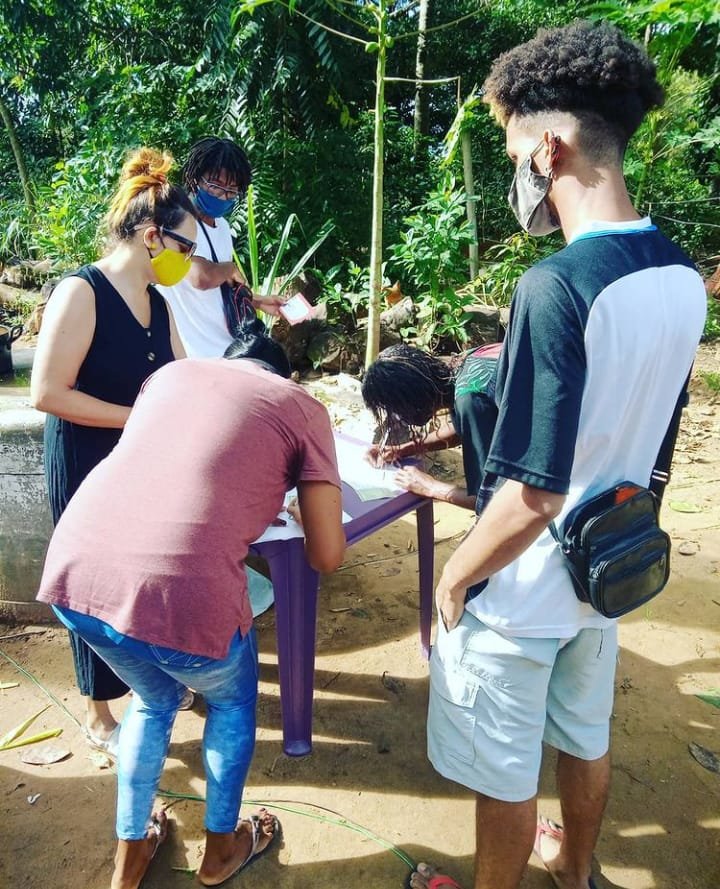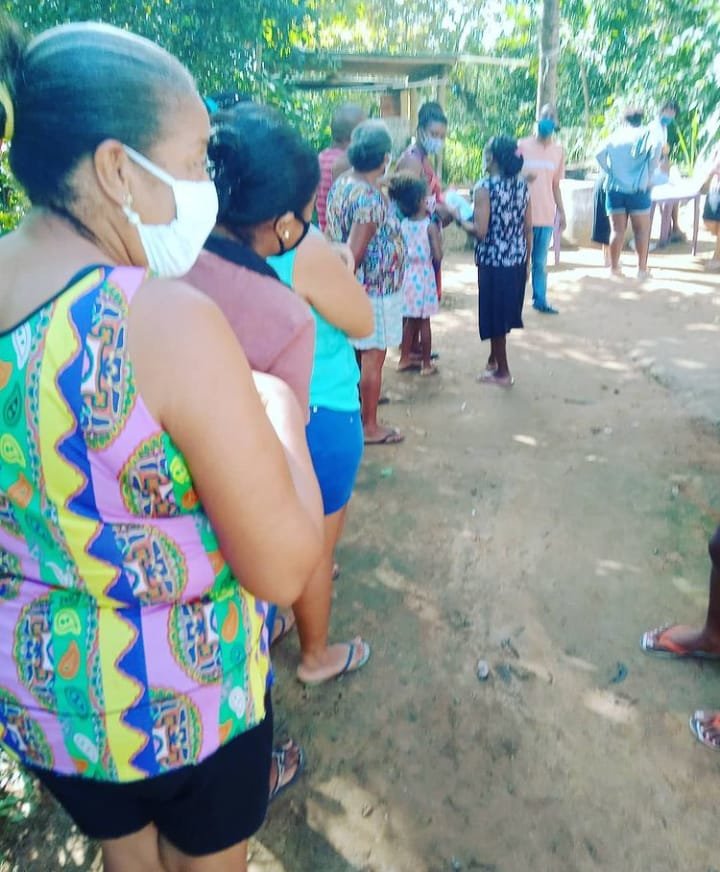By Cressida Evans | Consultant
Dear Viva a Vida Friends and Supporters,
Today we’d like to tell you about a new strand of our work:
Reaching Traditional Peoples and Communities
As some of you know, Bahia is a stronghold of indigenous peoples, quilombolas (the former enslaved who historically set up refuge communities or ‘quilombos’ after fleeing slavery), traditional communities of African origin religions, extractivists, riverside dwellers, indigenous caboclos, artisanal fishermen and others. These peoples and communities live far from the large centers, which makes it especially difficult for services and benefits to reach them.
In Camaçari, a few kilometers away from our community, you can find the Quilombolas of Cordoaria, with whom we have worked for almost 2 years; work that has become more frequent and necessary during the pandemic. In the neighboring municipality (Lauro de Freitas), we have also supported the Quilombo of Quingoma.
Through partnerships with private companies, public services, grant funding and your continued and valued donations, we have been able to serve 200 female-headed families from these communities. Most of them are beijuzeira women (who make traditional beiju pancakes) from the Farinha de Cordoaria (Camaçari) and Bela Vista (Lauro de Freitas) flour houses. During the pandemic, staple food baskets and food vouchers worth BRL 200.00 have been distributed to each family over two stages.
This intervention has been going on for 6 months, supporting women who are unable to sell their products because of the pandemic, most of whom live exclusively on the income from these sales. As we work with them, it is common to hear young women, matriarchs and the elderly thanking our work team for the emergency aid provided through your donations and “praying” for us and for you, our supporters.
As a result of this work, one of our grant funding proposals has been approved. This is aimed at continuing to provide these communities with food and political education, which is the main focus of Viva a Vida’s work, in addition to workshops on black entrepreneurship for beijuzeira women (to resume and enhance their sales), a T-shirt graffiti workshop for young people (so that they can learn a new trade and to guarantee some income) and storytelling for children about the Quilombo community (to maintain their traditions and foster the historical recovery of the region).
“We are so emotional, because no one ever remembers us. But the NGO [Viva a Vida] never forgets” said Maria Conceição, who is 67 years old and from the Cordoaria Quilombo.
“When I was healthy I used to run everywhere to bring food to my 8 children, now my age doesn't let me, I'm so glad you are here” said Dona Paulina, who is 80 years old and from the Quingoma Quilombo.
Other activities we have run over the last three months include:
Regular Work:
a) Classes: this year, our classes are taking place between May and December for more than 1,000 high school students from the Vila de Abrantes High School. Youth Worker Marcos Paulo tackles subjects such as Human Rights, Racism and Violence, as well as Poetic Writing. These activities are part of the Complementary Curriculum Activity of the State Department of Education, which has made its online platform available to Viva a Vida when classes have to be conducted virtually.
b) Global Fund For Children’s (GFC) CEO Group:
Évelin Salles, Viva a Vida’s Coordinator and Cressida Evans, our international consultant, have continued to participate in this group, representing various projects from around the world. These monthly meetings are aimed at strengthening organizations and provide an opportunity to discuss institutional demands, assessment instruments and new circumstances with our partners. The group has given Viva a Vida the opportunity to think about new methods for action, in addition to playing a fundamental role in energizing us to carry on in the struggle to keep the institution's mission alive.
c) Grant funding:
Viva a Vida has applied for 4 grants, one of which has been approved by the Ecumenical Coordination of Service (Coordenadoria Ecumênica de Serviço: CESE), while we are waiting for the outcome of three others: one from the UK-based Volant Trust and one from the State of Bahia’s Department for the Promotion of Equality (Secretaria de Promoção da Igualdade do Estado da Bahia: SEPROMI), both to support our work in the quilombos, with Political Training for women, young people and children. The final grant is from the State Department of Culture's Culture in the Palm of your Hand (Cultura na Palma da Mão) grant for four virtual presentations of our play Independencia with live streamed debates about the its themes, particularly focussing on racism and to add sign language translation to Viva a Vida’s official video of the performance.
Workshop:
On 16 September we ran a workshop with project families from the Vida Adiante Institute, assisted by SOS Villages, providing emergency aid (staple food baskets and hygiene kits), and addressing risk and protective factors against drug abuse, with an emphasis on the importance of demonstrating love and affection within the family during the pandemic. Thirty families participated in the workshop and talked about their experiences as women, mothers and heads of their families.
Emergency aid:
JULY – 200 Families were assisted by the NO HUNGER project, a partnership between the volunteer group ATADOS and the NGO GERANDO FALCÕES. Families from the Quilombos of Cordoaria and Quingoma, women from the Vida Adiante Institute’s Project, indigenous groups from Vila de Abrantes and Lauro de Freitas, and Viva a Vida beneficiaries all received emergency aid.
JUNE - 100 Families from the Quilombo de Cordoaria, 95% of whom are female heads of households, received staple food baskets donated by a large private company in the region.
Many thanks, as ever for your amazing support, which has enabled us to reach some of the most vulnerable young people and families during these difficult times!
Project reports on GlobalGiving are posted directly to globalgiving.org by Project Leaders as they are completed, generally every 3-4 months. To protect the integrity of these documents, GlobalGiving does not alter them; therefore you may find some language or formatting issues.
If you donate to this project or have donated to this project, you can receive an email when this project posts a report. You can also subscribe for reports without donating.
Support this important cause by creating a personalized fundraising page.
Start a Fundraiser


